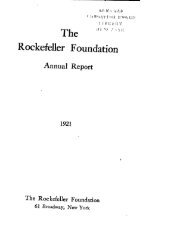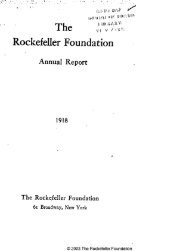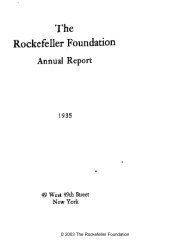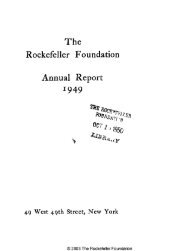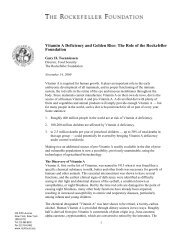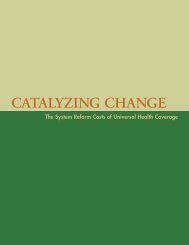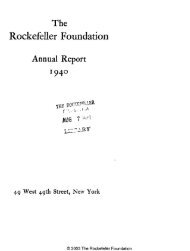Strong Ministries for Strong Health Systems - The Rockefeller
Strong Ministries for Strong Health Systems - The Rockefeller
Strong Ministries for Strong Health Systems - The Rockefeller
Create successful ePaper yourself
Turn your PDF publications into a flip-book with our unique Google optimized e-Paper software.
Appendix 2:<br />
Core Governmental Functions of <strong>Ministries</strong> of <strong>Health</strong><br />
1. Policy Making<br />
• Initiating, shaping, supporting passage of, and implementing legislation<br />
• Setting national health goals (within the framework of national development plans and programs)<br />
• Coordinating development of a national health/health systems plan, including health work<strong>for</strong>ce needs<br />
• Establishing the framework (priorities and methods) <strong>for</strong> health systems financing (national, regional and local government funds, ODA, private sector)<br />
• Assuring a mechanism <strong>for</strong> collaboration/consultation/joint planning across government, across sectors, and with the public to promote health in all policies.<br />
2. Financing and Resource Mobilization<br />
• Advocate <strong>for</strong> resources <strong>for</strong> health systems<br />
• National Budget, ODA, private pay revenue allocation and management:<br />
– basic benefits package personal health care; population/public health services;<br />
• research support; work<strong>for</strong>ce employment and training<br />
• Indirect (grants) to regional and local government and grants/contracts to private sector<br />
• Facilitate priority setting <strong>for</strong> regional and local government raised revenue <strong>for</strong> allocation/return to center<br />
3. Standard Setting/Regulation (Monitoring and Oversight): Public and Private Sectors<br />
• Provider certification <strong>for</strong> market participation<br />
• Quality of care standards and oversight<br />
• Standard setting, quality control, regulation (directly or through parastatal)<br />
- drugs, biologics and devices, foods<br />
• Scientific basis <strong>for</strong> standard setting with other agencies of government, e.g., occupational health and safety, environmental health, etc.<br />
• Licensure of health professionals with Ministry of Education<br />
• Licensure/certification of traditional medicine providers<br />
4. Collecting and Disseminating In<strong>for</strong>mation<br />
• Reporting requirements <strong>for</strong> national funds – all sources<br />
• Public health and vital statistics<br />
• Disease surveillance<br />
• <strong>Health</strong> care delivery system in<strong>for</strong>mation<br />
• Work<strong>for</strong>ce data<br />
• Population health surveys<br />
• Research findings<br />
5. Support <strong>for</strong> Research and Training<br />
• Direct management (see below) or indirect, through financing<br />
6. Technical Assistance/Capacity Building<br />
• Within the ministry<br />
• In regional and local government entities<br />
• In regional organizations<br />
7. Direct (or Contract) Management<br />
• National, regional, local health service providers<br />
• Insurance mechanisms<br />
• Research systems<br />
• Direct training or continuing professional education programs<br />
8. International Liaison<br />
• International relations with other health ministries<br />
• Liaison with international health organizations<br />
• Liaison with health related international technical assistance experts<br />
28 <strong>Strong</strong> <strong>Ministries</strong> <strong>for</strong> <strong>Strong</strong> <strong>Health</strong> <strong>Systems</strong>




